- Home
- Cassandra Clare
Clockwork Angel tid-1 Page 2
Clockwork Angel tid-1 Read online
Page 2
"Nothing you need worry about," said Mrs. Black, who had already climbed inside and had her skirts spread out across one of the comfortable-looking seats. The inside of the carriage was richly decorated with plush purple velvet bench seats facing each other, and gold tasseled curtains hanging in the windows.
Mrs. Dark helped Tessa up into the carriage, then clambered in behind her. As Tessa settled herself on the bench seat, Mrs. Black reached to shut the carriage door behind her sister, closing out the gray sky. When she smiled, her teeth gleamed in the dimness as if they were made out of metal. "Do settle in, Theresa. We've a long ride ahead of us."
Tessa put a hand to the clockwork angel at her throat, taking comfort in its steady ticking, as the carriage lurched forward into the rain.
SIX WEEKS LATER
1
THE DARK HOUSE
Beyond this place of wrath and tears
Looms but the Horror of the shade
—William Ernest Henley, "Invictus"
"The Sisters would like to see you in their chambers, Miss Gray."
Tessa set the book she had been reading down on the bedside table, and turned to see Miranda standing in the doorway of her small room—just as she did at this time every day, delivering the same message she delivered every day. In a moment Tessa would ask her to wait in the corridor, and Miranda would leave the room. Ten minutes later she'd return and say the same thing again. If Tessa didn't come obediently after a few of these attempts, Miranda would seize her and drag her, kicking and screaming, down the stairs to the hot, stinking room where the Dark Sisters waited.
It had happened every day of the first week that Tessa had been in the Dark House, as she had come to call the place they kept her prisoner, until eventually Tessa had realized that the screaming and kicking didn't do much good and simply wasted her energy. Energy that was probably better saved for other things.
"One moment, Miranda," Tessa said. The maid bobbed an awkward curtsy and went out of the room, shutting the door behind her.
Tessa rose to her feet, glancing around the small room that had been her prison cell for six weeks. It was small, with flowered wallpaper, and sparsely furnished—a plain deal table with a white lace cloth over it where she ate her meals; the narrow brass bed where she slept; the cracked washstand and porcelain jug for her ablutions; the windowsill where she stacked her books, and the small chair where she sat each night and wrote letters to her brother—letters she knew she could never send, letters she kept hidden under her mattress where the Dark Sisters would not find them. It was her way of keeping a diary and of assuring herself, somehow, that she would see Nate again someday and be able to give them to him.
She crossed the room to the mirror that hung against the far wall, and smoothed down her hair. The Dark Sisters, as they in fact seemed to wish to be called, preferred her not to look messy, although they didn't appear to mind her appearance one way or the other past that—which was fortunate, because her reflection made her wince. There was the pale oval of her face dominated by hollow gray eyes—a shadowed face without color in its cheeks or hope in its expression. She wore the unflattering black schoolmarmish dress that the Sisters had given her once she'd arrived; her trunk had never followed her, despite their promises, and this was now the only piece of clothing she owned. She looked away quickly.
She hadn't always flinched from her reflection. Nate, with his fair good looks, was the one in the family generally agreed to have inherited her mother's beauty, but Tessa had always been perfectly content with her own smooth brown hair and steady gray eyes. Jane Eyre had had brown hair, and plenty of other heroines besides. And it wasn't so bad being tall, either—taller than most of the boys her own age, it was true, but Aunt Harriet had always said that as long as a tall woman carried herself well, she would forever look regal.
She didn't look regal now, though. She looked pinched and bedraggled and altogether like a frightened scarecrow. She wondered if Nate would even recognize her if he saw her today.
At that thought her heart seemed to shrink inside her chest. Nate. He was the one she was doing all this for, but sometimes she missed him so much it felt like she'd swallowed broken glass. Without him, she was completely alone in the world. There was no one at all for her. No one in the world who cared whether she lived or died. Sometimes the horror of that thought threatened to overwhelm her and plunge her down into a bottomless darkness from which there would be no return. If no one in the entire world cared about you, did you really exist at all?
The click of the lock cut her thoughts off abruptly. The door opened; Miranda stood on the threshold.
"It is time to come with me now," she said. "Mrs. Black and Mrs. Dark are waiting."
Tessa looked at her in distaste. She couldn't guess how old Miranda was. Nineteen? Twenty-five? There was something ageless about her smooth round face. Her hair was the color of ditch water, pulled back harshly behind her ears. Exactly like the Dark Sisters' coachman, she had eyes that protruded like a frog's and made her look like she was permanently surprised. Tessa thought they must be related.
As they went downstairs together, Miranda marching along with her graceless, clipped gait, Tessa raised her hand to touch the chain around her throat where the clockwork angel hung. It was habit—something she did each time she was forced to see the Dark Sisters. Somehow the feel of the pendant around her neck reassured her. She kept hold of it as they passed landing after landing. There were several levels of corridors to the Dark House, though Tessa had seen nothing of it but the Dark Sisters' chambers, the halls and stairs, and her own room. Finally they reached the shadowed cellar. It was dank down here, the walls clammy with unpleasant moisture, though apparently the Sisters didn't mind. Their office was ahead, through a set of wide double doors. A narrow corridor led away in the other direction, vanishing into darkness; Tessa had no idea what lay down that hallway, but something about the thickness of the shadows made her glad she had never found out.
The doors to the Sisters' office were open. Miranda didn't hesitate, but clomped inside, Tessa following after her with great reluctance. She hated this room more than any other place on earth.
To begin with, it was always hot and wet inside, like a swamp, even when the skies outside were gray and rainy. The walls seemed to seep moisture, and the upholstery on the seats and sofas was always blooming with mold. It smelled strange as well, like the banks of the Hudson on a hot day: water and garbage and silt.
The Sisters were already there, as they always were, seated behind their enormous raised desk. They were their usual colorful selves, Mrs. Black in a dress of vibrant salmon pink and Mrs. Dark in a gown of peacock blue. Above the brilliantly colored satins, their faces were like deflated gray balloons. They both wore gloves despite how hot the room was.
"Leave us now, Miranda," said Mrs. Black, who was spinning the heavy brass globe they kept on the desk with one plump, white-gloved finger. Tessa had many times tried to get a better look at the globe—something about the way the continents were laid out had never looked quite right to her, especially the space in the center of Europe—but the sisters always kept her away from it. "And shut the door behind you."
Expressionless, Miranda did as asked. Tessa tried not to wince as the door shut behind her, closing off what little breeze there was in this airless place.
Mrs. Dark tilted her head to the side. "Come here, Theresa." Of the two women, she was the more kind—more likely to wheedle and persuade than her sister, who liked to convince with slaps and hissed threats. "And take this."
She held something out: a dilapidated bit of pink fabric tied in a bow, the sort that might be used as a girl's hair ribbon.
She was used to being handed things by the Dark Sisters now. Things that had once belonged to people: tie pins and watches, mourning jewelry, and children's toys. Once the laces of a boot; once a single earring, stained with blood.
"Take this," said Mrs. Dark again, a hint of impatience in her voice. "And Change.
"
Tessa took the bow. It lay in her hand, as light as a moth's wing, and the Dark Sisters stared impassively at her. She remembered books she had read, novels in which characters were on trial, standing quaking in the dock at the Old Bailey and praying for a verdict of not guilty. She often felt she was on trial herself in this room, without knowing of what crime she stood accused.
She turned the bow over in her hand, remembering the first time the Dark Sisters had handed an object to her—a woman's glove, with pearl buttons at the wrist. They had shouted at her to Change, had slapped her and shaken her as she'd told them over and over again with rising hysteria that she had no idea what they were talking about, no idea what they were asking her to do.
She hadn't cried, even though she'd wanted to. Tessa hated to cry, especially in front of people she didn't trust. And of the only two people in the world she trusted, one was dead and the other imprisoned. They had told her that, the Dark Sisters, had told her that they had Nate, and if she didn't do what they said, he would die. They'd showed her his ring, the one that had been her father's—stained with blood now—to prove it. They hadn't let her hold it or touch it, had snatched it back as she'd reached for it, but she'd recognized it. It was Nate's.
After that she had done everything they'd asked. Had drunk the potions they'd given her, done the hours of agonizing exercises, forced herself to think the way they wanted her to. They'd told her to imagine herself as clay, being shaped and molded on the potter's wheel, her form amorphous and changeable. They'd told her to reach down into the objects they'd given her, to imagine them as living things, and to draw out the spirit that animated them.
It had taken weeks, and the first time she had Changed, it had been so blindingly painful that she'd vomited and passed out. When she'd woken, she'd been lying on one of the moldering chaises in the Dark Sisters' rooms, a damp towel being sponged across her face. Mrs. Black had been leaning down over her, her breath as bitter as vinegar, her eyes alight. "You did well today, Theresa," she had said. "Very well."
That evening when Tessa had gone up to her room, there had been gifts for her, two new books on her bedside table. Somehow the Dark Sisters had realized that reading and novels were Tessa's passion. There was a copy of Great Expectations and—of all things— Little Women. Tessa had hugged the books to herself and, alone and unwatched in her room, had let herself cry.
It had grown easier since then, the Changing. Tessa still didn't understand what happened inside her to make it possible, but she had memorized the series of steps the Dark Sisters had taught her, the way a blind person might memorize the number of paces it takes to walk from their bed to the door of their room. She didn't know what was around her in the strange dark place they asked her to journey to, but she knew the pathway through it.
She drew on those memories now, tightening her grip on the ragged bit of pink fabric she held. She opened her mind and let the darkness come down, let the connection that bound her to the hair ribbon and the spirit inside it—the ghostly echo of the person who had once owned it—unravel like a golden thread leading through the shadows. The room she was in, the oppressive heat, the noisy breathing of the Dark Sisters, all of it fell away as she followed the thread, as the light grew more intense around her and she wrapped herself in it as if she were wrapping herself in a blanket.
Her skin began to tingle and to sting with thousands of tiny shocks. This had been the worst part, once—the part that had convinced her she was dying. Now she was used to it, and bore it stoically as she shuddered all over, from her scalp to her toes. The clockwork angel around her throat seemed to tick faster, as if in rhythm with her speeding heart. The pressure inside her skin built—Tessa gasped—and her eyes, which had been closed, flew open as the sensation built to a crescendo—and then vanished.
It was over.
Tessa blinked dizzily. The first moment after a Change was always like blinking water out of your eyes after submerging yourself in a bath. She looked down at herself. Her new body was slight, almost frail, and the fabric of her dress hung loose, pooling on the floor at her feet. Her hands, clasped in front of her, were pale and thin, with chapped tips and bitten nails. Unfamiliar, alien hands.
"What is your name?" Mrs. Black demanded. She had risen to her feet and was looking down at Tessa with her pale eyes burning. She looked almost hungry.
Tessa didn't have to answer. The girl whose skin she wore answered for her, speaking through her the way spirits were said to speak through their mediums—but Tessa hated to think about it that way; the Change was so much more intimate, so much more frightening, than that. "Emma," the voice that came from Tessa said. "Miss Emma Bayliss, ma'am."
"And who are you, Emma Bayliss?"
The voice replied, words tumbling out of Tessa's mouth, bringing strong images with them. Born in Cheapside, Emma had been one of six children. Her father was dead, and her mother sold peppermint water from a cart in the East End. Emma had learned to sew to bring in money when she was still a small child. Nights, she spent sitting at the little table in her kitchen, sewing seams by the light of a tallow candle. Sometimes, when the candle burned down and there was no money for another, she would go out into the streets and sit below one of the municipal gas lamps, using its light to sew by... .
"Is that what you were doing out on the street the night you died, Emma Bayliss?" asked Mrs. Dark. She was smiling thinly now, running her tongue over her lower lip, as if she could sense what the answer would be.
Tessa saw narrow, shadowy streets, wrapped in thick fog, a silver needle working by faint yellow gaslight. A step, muffled in the fog. Hands that reached out of the shadows and took hold of her shoulders, hands that dragged her, screaming, into the darkness. The needle and thread falling from her hands, the bows ripped from her hair as she struggled. A harsh voice shouting something angry. And then the silver blade of a knife flashing down through the dark, slicing into her skin, drawing out the blood. Pain that was like fire, and terror like nothing else she'd ever known. She kicked out at the man holding her, succeeding in knocking the dagger from his hand; she caught the blade and ran, stumbling as she weakened, the blood draining out of her fast, so fast. She crumpled in an alley, hearing the hissing scream of something behind her. She knew it was following her, and she was hoping to die before it reached her—
The Change shattered like glass. With a cry Tessa fell to her knees, the torn little bow falling from her hand. It was her hand again—Emma had gone, like a cast-off skin. Tessa was once more alone inside her own mind.
Mrs. Black's voice came from far away. "Theresa? Where is Emma?"
"She's dead," Tessa whispered. "She died in an alley—bled to death."
"Good." Mrs. Dark exhaled, a sound of satisfaction. "Well done, Theresa. That was very good."
Tessa said nothing. The front of her dress was splotched with blood, but there was no pain. She knew it was not her blood; it wasn't the first time this had happened. She closed her eyes, spinning in the darkness, willing herself not to faint.
"We should have had her do this before," said Mrs. Black. "The matter of the Bayliss girl has been bothering me."
Mrs. Dark's reply was curt. "I wasn't sure she was up to it. You remember what happened with the Adams woman."
Tessa knew immediately what they were talking about. Weeks ago she had Changed into a woman who had died of a gunshot wound to the heart; blood had poured down her dress and she had Changed back immediately, screaming in hysterical terror until the Sisters had made her see that she herself was unharmed.
"She's advanced wonderfully since then, don't you think, Sister?" Mrs. Black said. "Given what we had to work with in the beginning—she didn't even know what she was."
"Indeed, she was absolutely unformed clay," Mrs. Dark agreed. "We have truly worked a miracle here. I can't see how the Magister could fail to be pleased."
Mrs. Black gave a little gasp. "Does that mean—Do you think it's time?"
"Oh, absolutely, my dear
sister. She's as ready as she'll ever be. It's time for our Theresa to meet her master." There was a gloating note in Mrs. Dark's voice, a sound so unpleasant that it cut through Tessa's blinding dizziness. What were they talking about? Who was the Magister? She watched through lowered eyelashes as Mrs. Dark jerked the silk bellpull that would summon Miranda to come and take Tessa back to her room. It appeared that the lesson was over for today.
"Perhaps tomorrow," Mrs. Black said, "or even tonight. If we told the Magister she was ready, I cannot imagine he would not hurry here without delay."
Mrs. Dark, stepping out from behind the desk, chuckled. "I understand that you're eager to be paid for all our work, dear sister. But Theresa must not be simply ready. She must be ... presentable as well as able. Don't you agree?"
Mrs. Black, following her sister, muttered a response that was cut short as the door opened and Miranda came in. She wore the same dull look as ever. The sight of Tessa crouched and bloody on the floor seemed to occasion no surprise in her. Then again, Tessa thought, she had probably seen far worse in this room.
"Take the girl back up to her room, Miranda." The eagerness was gone from Mrs. Black's voice, and she was all brusqueness again. "Get the things—you know, the ones we showed you—and get her dressed and ready."
"The things ... you showed me?" Miranda sounded blank.
Mrs. Dark and Mrs. Black exchanged a disgusted look, and approached Miranda, blocking Tessa's view of the girl. Tessa heard them whispering to her, and caught a few words—"dresses" and "wardrobe room" and "do what you can to make her look pretty," and then finally, Tessa heard the rather cruel, "I'm not sure Miranda is clever enough to obey vague instructions of that sort, sister."
Make her look pretty. But what did they care whether she looked pretty or not, when they could force her to look any way they wanted? What did it matter what her true appearance was? And why would the Magister care? Though, it was very clear from the Sisters' behavior that they believed he would.

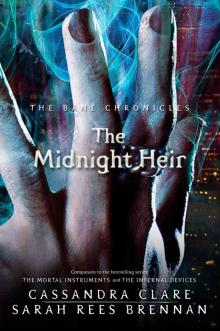 The Midnight Heir
The Midnight Heir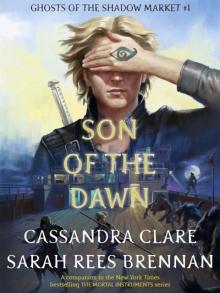 Son of the Dawn
Son of the Dawn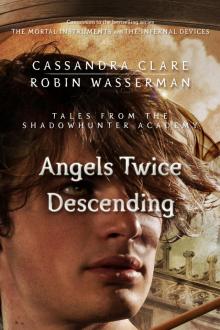 Angels Twice Descending
Angels Twice Descending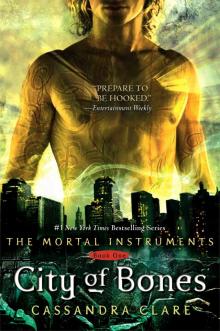 City of Bones
City of Bones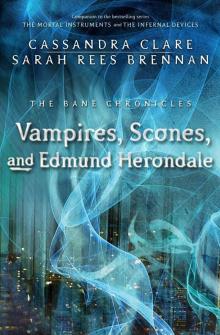 Vampires, Scones, and Edmund Herondale
Vampires, Scones, and Edmund Herondale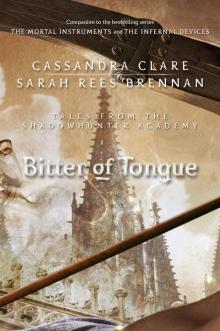 Bitter of Tongue
Bitter of Tongue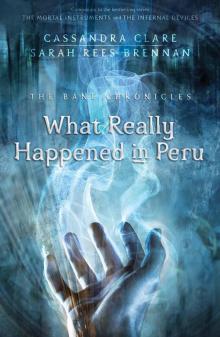 What Really Happened in Peru
What Really Happened in Peru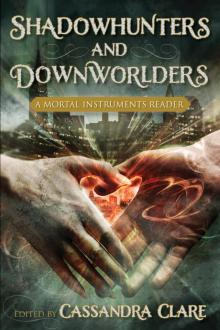 Shadowhunters and Downworlders
Shadowhunters and Downworlders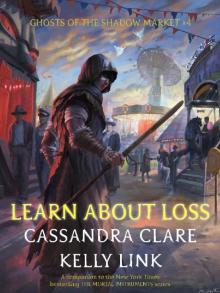 Learn About Loss
Learn About Loss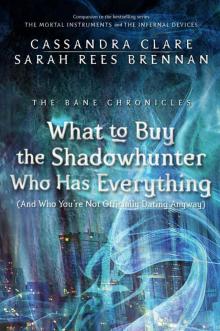 What to Buy the Shadowhunter Who Has Everything
What to Buy the Shadowhunter Who Has Everything Welcome to Shadowhunter Academy
Welcome to Shadowhunter Academy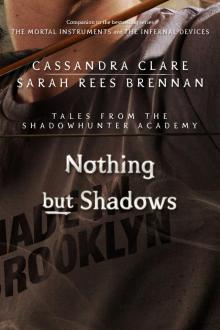 Nothing but Shadows
Nothing but Shadows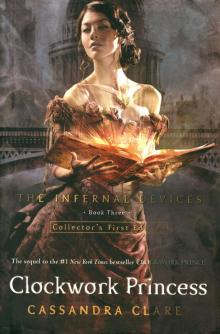 Clockwork Prince
Clockwork Prince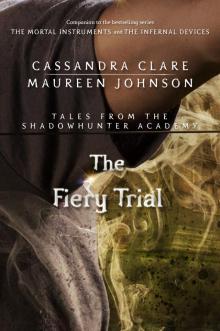 The Fiery Trial
The Fiery Trial City of Glass
City of Glass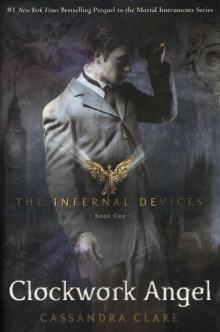 Clockwork Angel
Clockwork Angel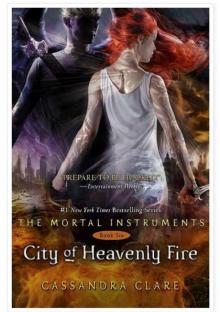 City of Heavenly Fire
City of Heavenly Fire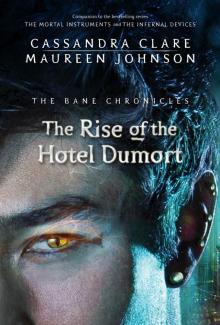 The Rise of the Hotel Dumort
The Rise of the Hotel Dumort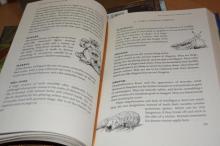 The Shadowhunters Codex
The Shadowhunters Codex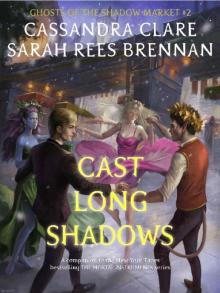 Cast Long Shadows
Cast Long Shadows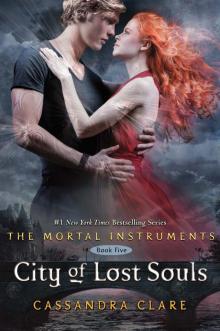 City of Lost Souls
City of Lost Souls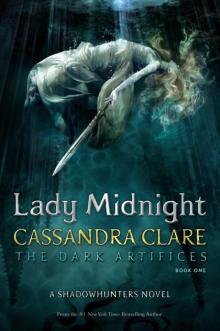 Lady Midnight
Lady Midnight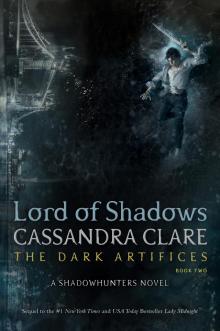 Lord of Shadows
Lord of Shadows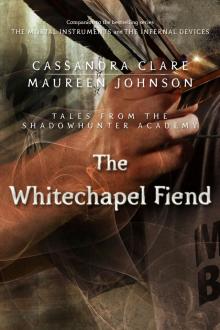 The Whitechapel Fiend
The Whitechapel Fiend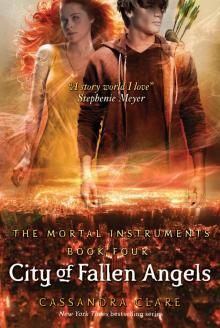 City of Fallen Angels
City of Fallen Angels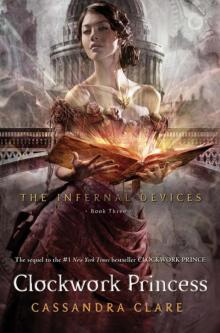 Clockwork Princess
Clockwork Princess Queen of Air and Darkness
Queen of Air and Darkness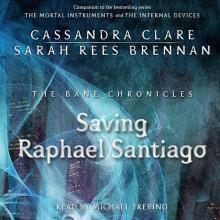 Saving Raphael Santiago
Saving Raphael Santiago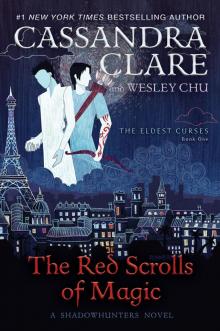 The Red Scrolls of Magic
The Red Scrolls of Magic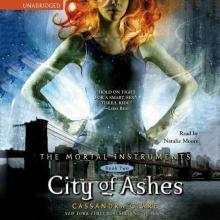 City of Ashes
City of Ashes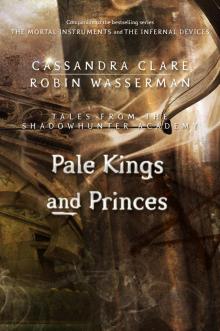 Pale Kings and Princes
Pale Kings and Princes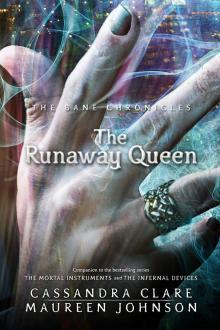 The Runaway Queen
The Runaway Queen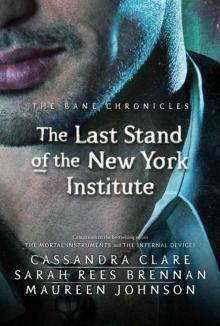 The Last Stand of the New York Institute
The Last Stand of the New York Institute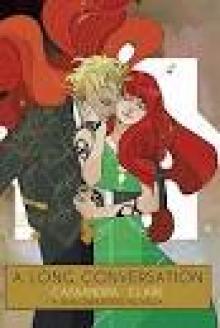 A Long Conversation (The Shadowhunter Chronicles)
A Long Conversation (The Shadowhunter Chronicles) The Lost Book of the White
The Lost Book of the White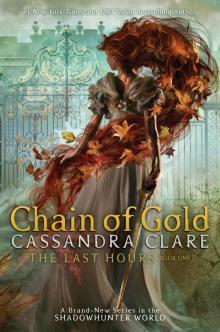 Chain of Gold
Chain of Gold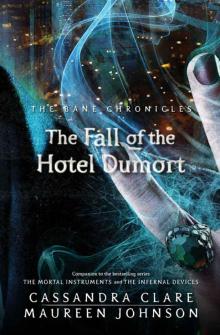 The Fall of the Hotel Dumort
The Fall of the Hotel Dumort Born to Endless Night
Born to Endless Night The Lost Herondale
The Lost Herondale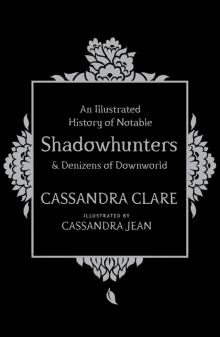 An Illustrated History of Notable Shadowhunters & Denizens of Downworld
An Illustrated History of Notable Shadowhunters & Denizens of Downworld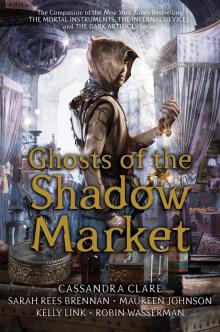 Ghosts of the Shadow Market
Ghosts of the Shadow Market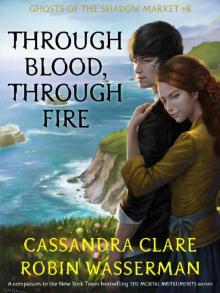 Through Blood, Through Fire
Through Blood, Through Fire Every Exquisite Thing
Every Exquisite Thing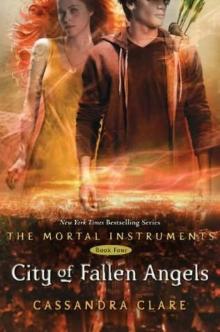 City of Fallen Angels mi-4
City of Fallen Angels mi-4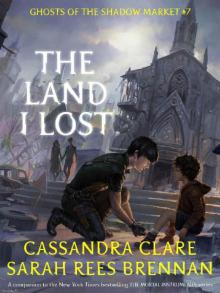 The Land I Lost (Ghosts of the Shadow Market Book 7)
The Land I Lost (Ghosts of the Shadow Market Book 7) Queen of Air and Darkness (The Dark Artifices #3)
Queen of Air and Darkness (The Dark Artifices #3)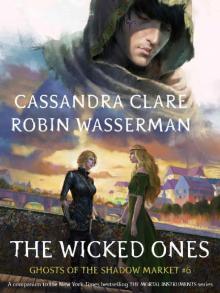 The Wicked Ones (Ghosts of the Shadow Market Book 6)
The Wicked Ones (Ghosts of the Shadow Market Book 6)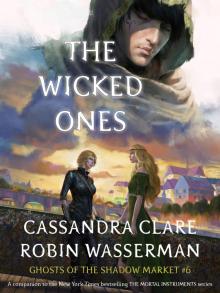 The Wicked Ones
The Wicked Ones A Deeper Love
A Deeper Love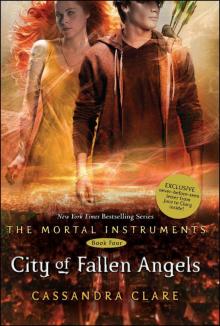 City of Fallen Angels (4)
City of Fallen Angels (4)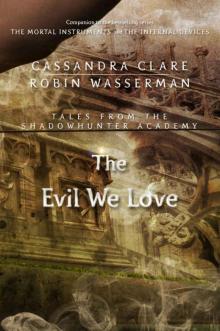 The Evil We Love (Tales from the Shadowhunter Academy Book 5)
The Evil We Love (Tales from the Shadowhunter Academy Book 5)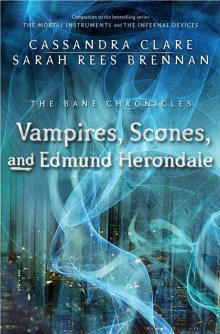 Vampires, Scones, and Edmund Herondale tbc-3
Vampires, Scones, and Edmund Herondale tbc-3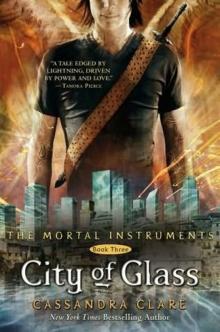 City of Glass mi-3
City of Glass mi-3 Tales from the Shadowhunter Academy
Tales from the Shadowhunter Academy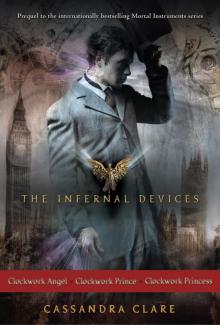 The Infernal Devices Series
The Infernal Devices Series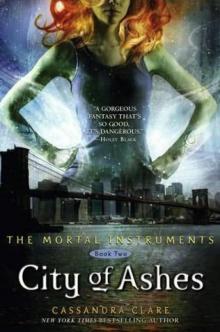 City of Ashes mi-2
City of Ashes mi-2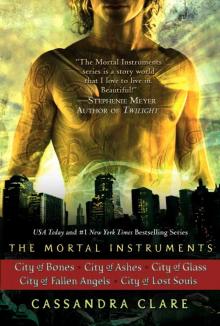 Cassandra Clare: The Mortal Instruments Series
Cassandra Clare: The Mortal Instruments Series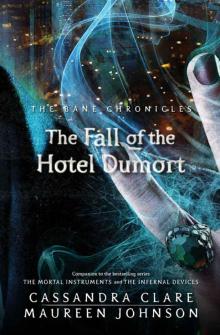 The Bane Chronicles 7: The Fall of the Hotel Dumort
The Bane Chronicles 7: The Fall of the Hotel Dumort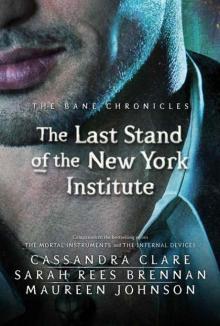 The Last Stand of the New York Institute (The Bane Chronicles)
The Last Stand of the New York Institute (The Bane Chronicles)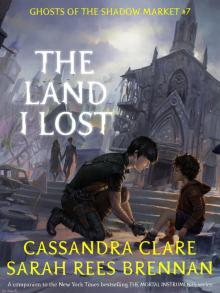 The Land I Lost
The Land I Lost![Saving Raphael Santiago - [Bane Chronicles 06] Read online](http://i1.bookreadfree.com/i1/04/03/saving_raphael_santiago_-_bane_chronicles_06_preview.jpg) Saving Raphael Santiago - [Bane Chronicles 06]
Saving Raphael Santiago - [Bane Chronicles 06]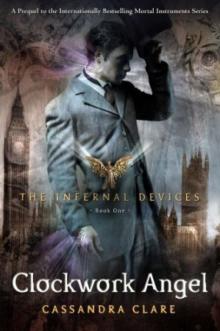 Clockwork Angel tid-1
Clockwork Angel tid-1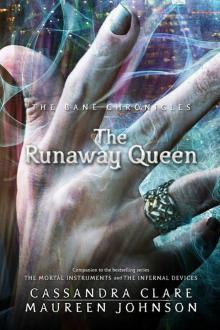 The Runaway Queen tbc-2
The Runaway Queen tbc-2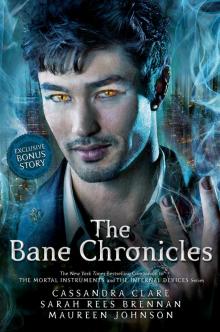 The Bane Chronicles
The Bane Chronicles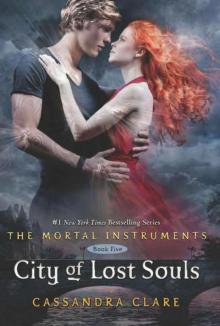 City of Lost Souls mi-5
City of Lost Souls mi-5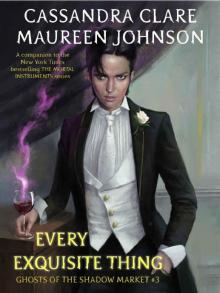 Every Exquisite Thing (Ghosts of the Shadow Market Book 3)
Every Exquisite Thing (Ghosts of the Shadow Market Book 3) Shadowhunter’s Codex
Shadowhunter’s Codex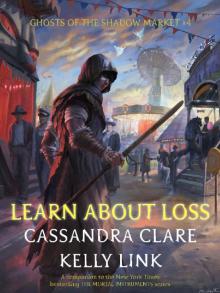 Learn About Loss (Ghosts of the Shadow Market Book 4)
Learn About Loss (Ghosts of the Shadow Market Book 4) Welcome to Shadowhunter Academy (Tales from the Shadowhunter Academy Book 1)
Welcome to Shadowhunter Academy (Tales from the Shadowhunter Academy Book 1)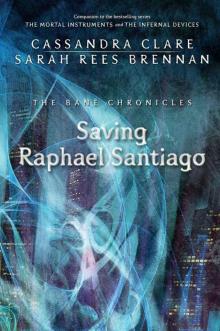 Saving Raphael Santiago tbc-6
Saving Raphael Santiago tbc-6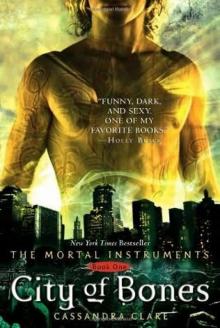 City of Bones mi-1
City of Bones mi-1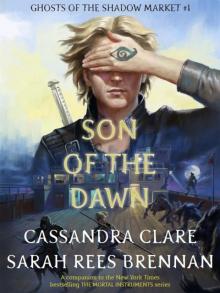 Ghosts of the Shadow Market Book 1_Son of the Dawn
Ghosts of the Shadow Market Book 1_Son of the Dawn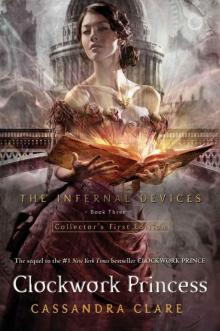 Clockwork Princess (Infernal Devices, The)
Clockwork Princess (Infernal Devices, The) Clockwork Prince tid-2
Clockwork Prince tid-2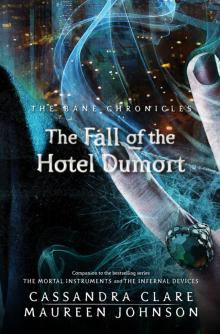 No Immortal Can Keep a Secret
No Immortal Can Keep a Secret A Deeper Love (Ghosts of the Shadow Market Book 5)
A Deeper Love (Ghosts of the Shadow Market Book 5)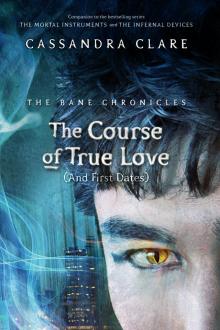 The Course of True Love (and First Dates)
The Course of True Love (and First Dates)